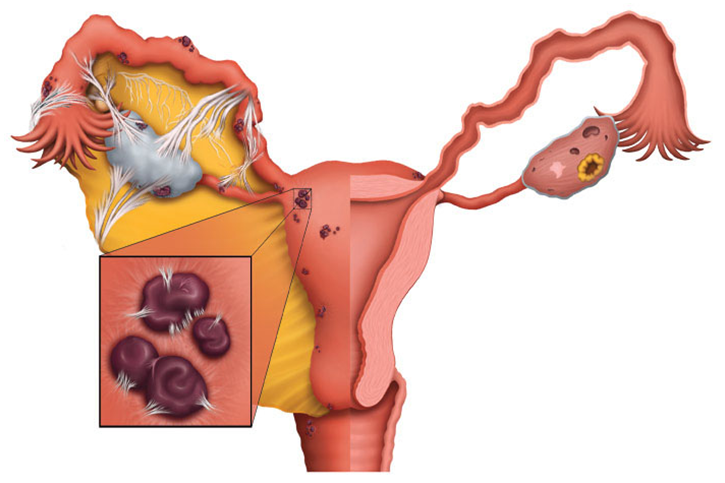Endometriosis is a common gynaecological condition where the endometrium (the lining of the uterus) grows outside a woman’s uterus.

Endometriosis is a common condition that can be very painful and cause quite a lot of discomfort. Here’s a look at the symptoms, risk factors and treatments avaliable.
It is a chronic condition that cause pain, which usually occurs during menstruation and progresses over time. It can also cause heavy periods, painful intercourse and infertility. It is very common, affecting roughly one in 10 women of reproductive age.
Symptoms of Endometriosis
Symptoms of endometriosis include:
Pain – This includes pain during or after sex, pain before and during menstruation, pelvic pain or pain in the abdomen, pain while passing urine or opening the bowels, and ovulation pain.
Abnormal Bleeding During Menstruation – Abnormal bleeding can be defined as heavy bleeding, clots, irregular bleeding, or bleeding longer than normal or prematurely.
Issues With The Bowel or Bladder – This includes bleeding, constipation, diarrhoea, frequent urination, bloating.
Other symptoms include:
• Mood swings
• Lethargy
• Nausea
• Infertility
• Changes to daily routine, or affected quality of life caused by other symptoms
Causes and Risk Factors of Endometriosis
The exact reason endometriosis occurs is unknown, but research suggests there are a number of possible causes and risk factors.
Retrograde menstruation – This is a some of the menstrual fluid flows backwards into the fallopian tubes instead of leaving the body through the vagina. From the fallopian tubes it can make its way into the pelvic cavity, where it may become attached to the ovaries or bowels, and there the endometrial tissue cells can begin to grow.
All women experience retrograde menstruation, however, some studies suggest that the link between it and endometriosis has something to do with the immune system, whereby it fails to control or stop the growth of endometrial tissue outside the uterus.
Family history – Women who have a family member who has had endometriosis are more likely to get it. It is also common that if one twin has the condition, the other will too.
Risk factors include:
• Irregular, heavy or painful periods.
• Allergies
• Obesity
Diagnosis of Endometriosis
If you are suffering from any symptoms of endometriosis, such as if you have heavy or painful periods or are having trouble getting pregnant, you should see your gynaecologist right away. Endometriosis is a progressive condition and symptoms may only get worse.
Currently, the only way to diagnose endometriosis correctly is laparoscopy – commonly known as keyhole surgery. This is an operation performed under general anaesthetic that employs thin surgical instruments to inspect the pelvic region for endometrial tissue. Some may be removed for further analysis, or treatment.
Management and Treatment of Endometriosis
Endometriosis can be treated in a number of ways, depending on the progression of the condition and severity of the symptoms. These range from symptom management to surgery.
Pain relief medication – This involves managing the pain from medication for pain relief such as anti-inflammatory drugs.
Hormone therapy – Hormone therapy can reduce the impact of endometriosis by suppressing the growth of endometrial cells, and stopping stopping the menstrual cycle. This may include taking the oral contraceptive pill, or taking progestins, using a progesterone releasng IUCD (Mirena), or gonadotrophin-releasing hormone (GnRH) agonists. Be sure to discuss the effects of hormone treatments with your doctor.
Surgery – Surgery is an effective way of removing abnormal endometrial tissue and repairing any damage it may have caused.
Types of surgery used include laparoscopy, which we looked at before; laparotomy, which is major operation that may be required to treat more severe cases of the condition, it involves a larger cut in the abdomen; and hysterectomy, the removal of the uterus, which may be an option if other treatments have not worked and the condition is severely impacting quality of life.
If you are suffering from any symptoms of endometriosis and would to book an appointment, please get touch in today.
Dr Bevan Brown is one of the most trusted gynaecologists in the Hills District of Sydney. We will strive to give you guidance and compassionate care in every way possible.
